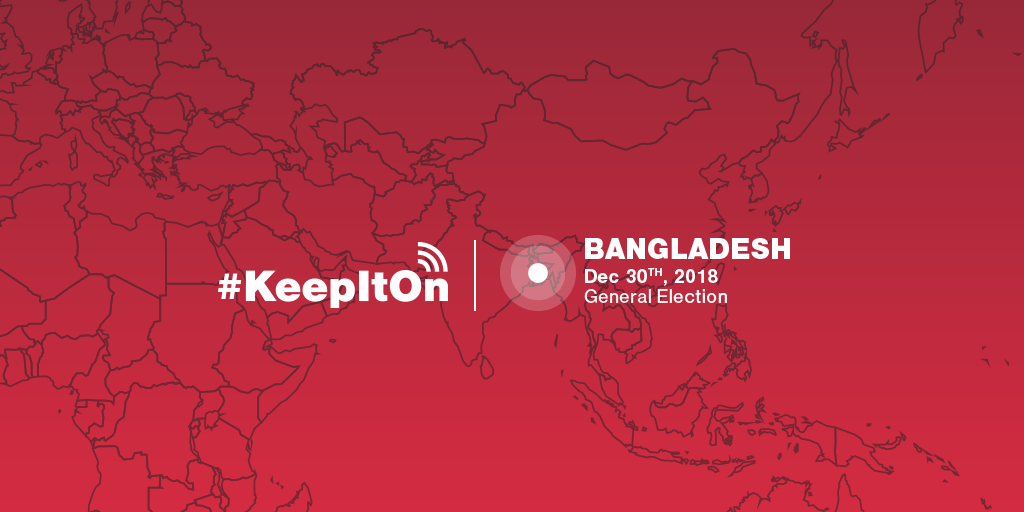As Bangladesh prepares to go to the polls on December 30th, the Bangladesh Telecommunication Regulatory Commission and the government have reportedly decided to downgrade mobile internet from 4G to 2G, slow down broadband internet, and block mobile banking before and during the elections. The rationale cited is to block “fake news and propaganda.” But there’s no evidence to show that using inherently broad, disproportionate measures like these will stop the spread of disinformation. At the same time, there is plenty to show it will put people in danger, harm free expression and other human rights, and damage the economy.
Free expression under attack at a critical time
This is not the first time Bangladesh has censored content, shut down, or throttled the internet. In February, the Regulatory Commission ordered all internet service providers deliberately to slow down the internet speed during school exams. In August 2018, rather than dealing with the issues that led to massive student protests, the government responded by slowing down mobile internet. Just last month, Bangladesh authorities blocked Skype for one day without sufficient justification, in keeping with the government’s recent website censorship and blocking sprint. In the course of one week, authorities censored more than 50 news portals to fight misinformation. This is taking place as Bangladesh’s newly enacted Digital Security Act serves to restrict freedom of expression and silence the media.
Elections periods can be tense in many countries, and in Bangladesh, there have already been violent political protests that have claimed the lives of many and injured even more. When elections are coupled with violent political protests like this, it becomes more, not less, essential that people have full access to information, the ability to reach emergency and medical services, and the capacity to check in with their family and friends to see if they are okay. Slowing down the internet or even plunging people into darkness entirely means that more lives are put at risk.
Deliberately slowing down or cutting off access to the internet also damages business. A shutdown would cost an estimated $63,419,225 or BDT 5,310,345,402 per day, according to the COST tool from #KeepItOn members NetBlocks and the Internet Society.
In our work documenting internet shutdowns during elections in places like Mali, Cameroon, and Pakistan, we have seen instances where, when governments have tampered with access to the internet, there are irregularities with the elections. In order to hold a free, fair, and peaceful election on December 30, the Bangladeshi government must refrain from slowing down, blocking, filtering, or shutting down the internet.
The #KeepItOn coalition, representing more than 175 organizations in 60 countries, therefore calls on government authorities in Bangladesh to retract the decision to slow down broadband internet and downgrade mobile network speeds and to notify the public of this decision.
Keep watch and share your story
Your story and any information you share about a shutdown that you experience can help strengthen the effort to end these harmful restrictions to human rights. You can help inform international media outlets and provide evidence for global advocacy against censorship and shutdowns in forums like the United Nations Human Rights Council.
During this upcoming election in Bangladesh, we encourage you to help the #KeepItOn coalition identify and report on any incident of online censorship, network shutdowns, and platform blocks you encounter by using this form to tell your shutdown story, providing concrete details on the direct impact that it has on your life. When we are able to document these incidents, we can support the fight to defend free expression in Bangladesh and around the world, so be sure to spread the word. We are listening.
